| Article ID | Journal | Published Year | Pages | File Type |
|---|---|---|---|---|
| 5807950 | European Journal of Integrative Medicine | 2014 | 7 Pages |
IntroductionThe present work aimed to evaluate the antibacterial activity, phytochemical constituents, and cytotoxic effect of plant based remedies which are traditionally used for the treatment of infections.MethodologyAntibacterial activity of the ethanol extracts of plant based preparations described in Thai Pharmaceutical Textbook namely: Tri-Khan-Tha-Wart, Tri-Ke-Son-Phet, Tri-Phit-Tha-Chak, Tri-Ka-Tuk, Tri-Pha-La, Tri-Kan-La-Phit, Tri-Chin-Tha-La-Ma-Ka, Tri-San, Tri-Sa-Mo, and Tri-Ke-Son-Mat were evaluated on 20 isolates of Gram-positive and Gram-negative pathogens. Qualitative phytochemical analysis and cytotoxic effect on Vero cells of the extracts were additionally performed.ResultsThe extract of Tri-Chin-Tha-La-Ma-Ka possessed the highest and most significant antibacterial activity with minimum inhibitory concentration (MIC) values of <16 μg/mL against methicillin resistant Staphylococcus aureus (MRSA), a biofilm-producing Staphylococcus epidermidis, acne lesion isolated coagulase-positive and coagulase-negative staphylococci isolates. Our preliminary phytochemical test revealed that triterpenoids and phenolics were common components found in all tested preparations. Most of the tested remedies had IC50 > 50 μg/mL on Vero cells, whereas Tri-Chin-Tha-La-Ma-Ka, Tri-Ka-Tuk, and Tri-Kan-La-Phit had IC50 value of 0.9, 48.8, and 28.9 μg/mL, respectively.ConclusionThese findings suggest that Tri-Chin-Tha-La-Ma-Ka could be further studied as a promising antibacterial agent. Investigations on other biological activities related to its traditional applications, appropriate biomarkers, and treatment mechanisms of the preparation are required.
